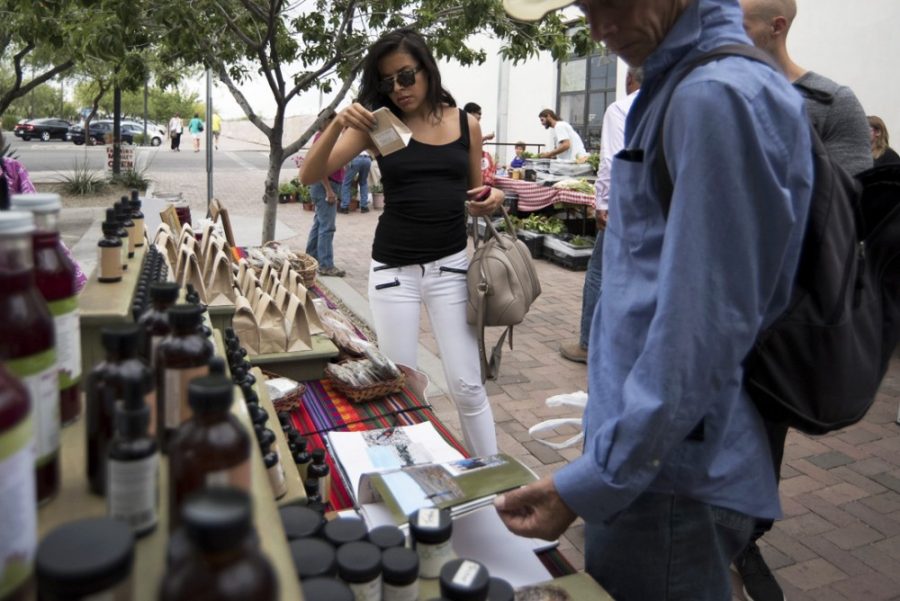Clouds hang low overhead. Humidity clings to market goers as fans wave cool, intermittent respite. Along a humming sidewalk at the Mercado San Agustín, a 41-year-old vender with a long braid hanging down his back listens to his inquisitive and returning customers. With a table full of dried herbs, medicinal tonics and baking spices from the region, John Slattery begins his day distributing sustainable fare to locals interested in alternative food options.
As an herbalist, forager, business owner, vitalizing healer and teacher, Slattery utilizes what the Southwest offers in an effort to encourage people to look outside their personal boundaries and into their kitchens.
“I want people to become curious about wild foods and inspire people to be creative,” Slattery said.
His class, hosted by the Food Conspiracy Co-op, is meant to keep people moving in the direction of locally sustained eating. This Thursday, the class will focus on preparing foraged foods like acorn meal and saguaro seeds into gourmet, healthy meals.
In his travels to Latin America to work alongside village elders and herbalists, Slattery observed how deep their different cultures and connections to the environment influence daily life. He tries to incorporate those learning experiences into his teachings.
Living in Tucson over the course of a decade, he has developed relationships with many sustainably minded Tucsonans, including Kelly Watters, the education and outreach coordinator for the Co-op. The community-centered organization hosts classes throughout the summer and bears part of the responsibility to educate the public as a part of the National Co-Op Grocers with 200 stores nationwide. Watters also noted that Tucson has a large community to support sustainable food.
“Community of Co-Op members … is something they are passionate about. The sharing economy is alive and well in Tucson,” Watters said.
The Co-op started in 1971 with just 20 employees who wanted to buy natural food that was not provided in grocery stores at the time. It’s since morphed into Tucson’s only full-service cooperative, offering a variety of quality products.
Owned by about 3,000 members — and not by a large corporation — the democratic way the company is run caters to its member’s needs.
In addition to Slattery’s lectures and hands-on classes, he also offers apprenticeships to those interested in learning more in-depth information about regional plants, like the mesquite tree.
At El Mercado San Agustín, Slattery takes a mesquite pod from a nearby tree, offering it as a sweet treat during the busy market session. The mesquite tree is a drought-resistant plant that grows quickly and can live for hundreds of years. It is native to a large part of the Southwestern U.S. and South America, and produces long, edible pods that can be eaten right off the tree. The naturally sweet pods are packed full of vital ingredients for the human body like calcium, iron and zinc, and are just one of the fruitful florae that can be harvested from the Sonoran Desert.
Described by apprentice Ela Harrison as a capable and enlightened mentor, his apprenticeship program looks to reconnect participants’ awareness of previous indigenous tribes with the world of plants in the Sonoran Desert. To foster this connection, his students are taken into southern Arizona’s natural habitat to promote a relational development with the environment.
“I feel challenged and inspired to do my best,” Harrison said.
In the Co-op classroom, having a person-to-person experience with a teacher is helpful, Watters noted. It fosters an environment for local, viable food options and shows “there’s so much more that the desert has to offer.”
For easy access and transportation, hop off the Seventh Street Sun Link Tucson Modern Streetcar stop across from the Co-op, located at 425 E. Seventh St.
Slattery’s class is $12 per person. To register, make sure to go to the Co-op website 24 hours before the class to reserve a spot.









